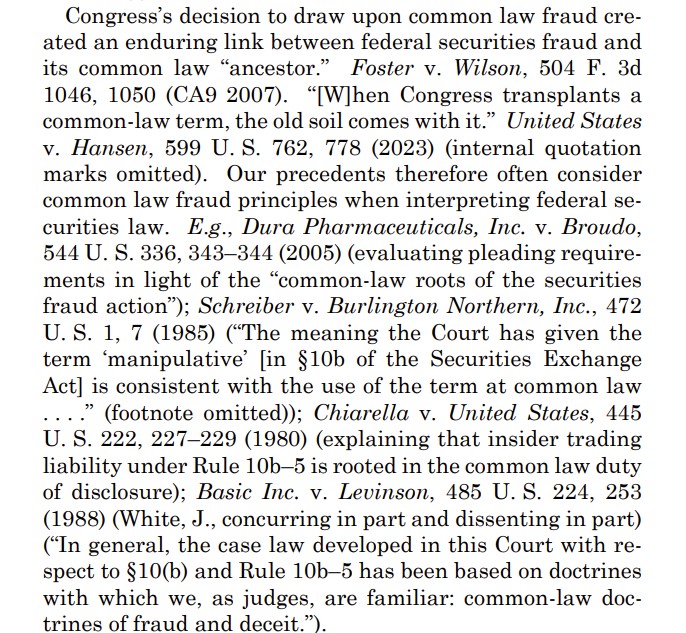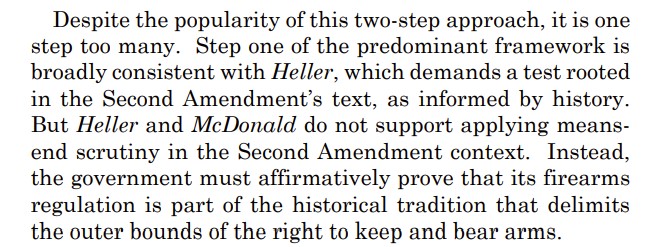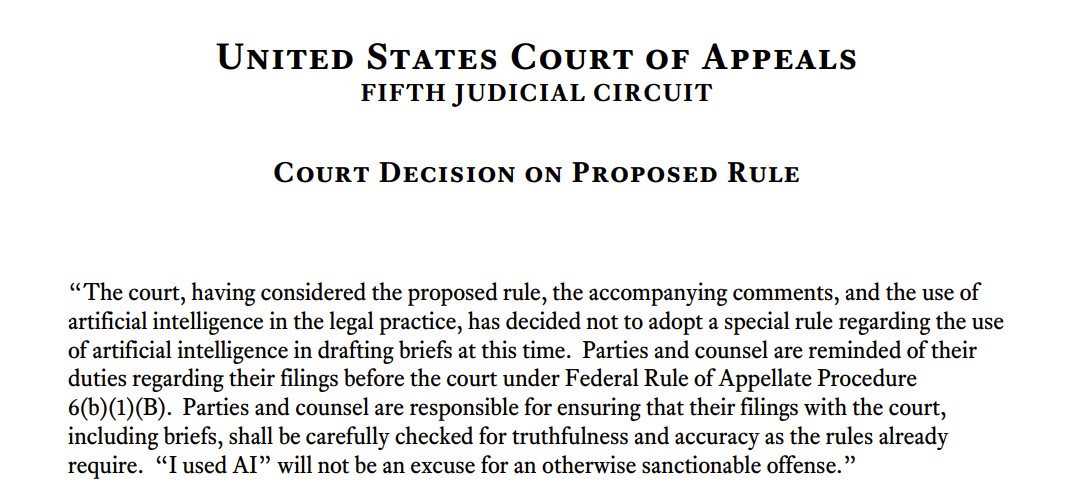Much ink will be spilled over the Supreme Court’s use of history in resolving cases this term about the Appropriations Clause, possession of firearms by dangerous people, and the SEC’s internal courts. One key point in Jarkesy is the extent to which a word, used in the 1790s, has the same general meaning today. As the below quote illustrates, “fraud is fraud” oversimplifies the Supreme Court’s holding – but not by much. “Fraud” in today’s commercial law means pretty much what it did in the 1790s. Other words, such as “economy,” are not so easily transported through time, and that reality calls for caution in seeing Jarkesy as providing broad support for some other “originalist” ideas.
Monthly Archives: June 2024
Fifth Circuit affirmed in SEC v. Jarkesy:
A defendant facing a fraud suit has the right to be tried by a jury of his peers before a neutral adjudicator. Rather than recognize that right, the dissent would permit Congress to concentrate the roles of prosecutor, judge, and jury in the hands of the Executive Branch. That is the very opposite of the separation of powers that the Constitution demands. Jarkesy and Patriot28 are entitled to a jury trial in an Article III court.
No. 22-859 (U.S. June 27, 2024).
The Supreme Court reversed the Fifth Circuit’s judgment in Murthy v. Missouri, a case about interaction between the federal government and social-media platforms during the COVID-19 pandemic. Again, the ground of reversal with standing, with the Supreme Court finding that the plaintiff’s claim of future injury was too attenuated, and that a “right-to-listen” theory of standing was not viable. No. 23-411 (U.S. June 26, 2024).
In  Paxton v. Dettelbach, individual plainitffs challenged a law about firearm silencers, making these statements about their standing:
Paxton v. Dettelbach, individual plainitffs challenged a law about firearm silencers, making these statements about their standing:
I intend to personally manufacture a firearm suppressor for my own non-commercial, personal use. The firearm suppressor will be manufactured in my home from basic materials without the inclusion of any part imported from another state other than a generic and insignificant part, such as a spring, screw, nut, or pin.
The Fifth Circuit found those statements inadequate for two reasons:
- “[T]he declarations do not state any intention to engage in conduct
proscribed by law,” because the federal law at issue was not a blanket prohibition (emphasis added). - “[T]he declarations lack the necessary detail to establish that the Individual Plaintiffs’ professed intent to make a silencer is sufficiently ‘serious’ to render their feared injury ‘imminent’ rather than merely speculative or hypothetical. As the Supreme Court explained in Lujan, at the summary-judgment stage, declarants’ profession of “‘some day’ intentions [to engage in certain conduct]—without any description of concrete plans, or indeed even any specification of when the some day will be—do not support a finding of the ‘actual or imminent’ injury” required for standing.”
And the Court rejected Texas’s claim to standing based on its “quasi-sovereign interests in its citizens’ health and well-being” and “its sovereign interest in the power to create and enforce a legal code.” No. 23-10802 (June 21, 2024).
In Lewis v. Crochet, the Fifth Circuit found that a ruling about the attorney-client privilege was properly appealed under the “collateral order” doctrine, applying Mohawk Indus. v. Carpenter, 558 U.S. 100, 103 (2009).
 Judge James Ho’s dissent from the denial of en banc review in Gonzalez v. Trevino persuaded the ultimate audience yesterday, when the Supreme Court reversed the Fifth Circuit, and allowed the wrongful-arrest claim of Sylvia Gonzalez – an unfortunate victim of small-town politics – to proceed past the pleadings stage. No. 22-1025 (U.S. June 21, 2024). His opinion built on Judge Andrew Oldham’s dissent at the panel stage.
Judge James Ho’s dissent from the denial of en banc review in Gonzalez v. Trevino persuaded the ultimate audience yesterday, when the Supreme Court reversed the Fifth Circuit, and allowed the wrongful-arrest claim of Sylvia Gonzalez – an unfortunate victim of small-town politics – to proceed past the pleadings stage. No. 22-1025 (U.S. June 21, 2024). His opinion built on Judge Andrew Oldham’s dissent at the panel stage.
Palmquist v. Hain Celestial Group, Inc. provides helpful summaries of two important standards for evaluating motions to remand:
- Repleading. “[A] plaintiff should not be penalized for adhering to the pleading standards of the jurisdiction in which the case was originally brought. Otherwise, where there are potentially diverse parties, plaintiffs would essentially have to plead the federal pleading standard in state court for fear of having their claims against non-diverse parties thrown out upon reaching federal courts for failing to comply with the demands of Rule 12(b)(6).”
- New Matters in Repleading. “[A]dding new causes of actions and clarifying already alleged causes of actions are not mutually exclusive. We have already determined that the Palmquists may not expand the substance of their pleadings, for jurisdictional purposes, with the negligent-undertaking allegations. We, too, follow circuit precedent by permitting them to ‘clarify’ their already averred jurisdictional allegations after removal for purposes of an improper joinder analysis.”
No. 23-40197 (May 28, 2024).
In 2022’s Bruen opinion, the Supreme Court disapproved of “means-ends” analysis in Second Amendment cases:
In today’s Rahimi opinion, the Supreme Court walked that disapproval back, while nominally following the same history-based test:
The result was an 8-1 reversal of the Fifth Circuit opinion holding that the subject of a domestic protective order had a Second Amendment right to carry a firearm. (I argued that the Fifth Circuit’s opinion took “history” too far in this Dallas Morning News editorial last year.)
On remand from the Supreme Court after that court’s rejection of a challenge to the CFPB’s funding based on the Appropriations Clause, the Fifth Circuit issued a short judgment reflecting that ruling. Interestingly, the judgment expressly identifies the rehearing deadline while striking an earlier 28j filing by the plaintiff:
 That filing is no longer available online, but the CFPB’s response suggests that the parties dispute the scope and effect of the Supreme Court’s mandate–and what that may mean for the other challenges to the CFPB presented in this case.
That filing is no longer available online, but the CFPB’s response suggests that the parties dispute the scope and effect of the Supreme Court’s mandate–and what that may mean for the other challenges to the CFPB presented in this case.
 In Chamber of Commerce v. Consumer Financial Protection Bureau, the district court (for the second time) transferred a challenge to a new CFPB rule to the District of the District of Columbia. The district court reasoned, inter alia:
In Chamber of Commerce v. Consumer Financial Protection Bureau, the district court (for the second time) transferred a challenge to a new CFPB rule to the District of the District of Columbia. The district court reasoned, inter alia:
“Under Plaintiffs’ theory, there isn’t a city in the country where venue would not lie, as every city has customers who may potentially be impacted by the Rule. Plaintiffs could find any Chamber of Commerce in any city of America and add them to this lawsuit in order to establish venue where they desire. It appears that this is exactly what Plaintiffs attempted to do by recommending transfer to the Eastern District of Texas, Tyler Division. Here, once again, the only tie to the Eastern District of Texas, Tyler Division, was that one of the Plaintiffs happens to be there. None of the events occurred there and there is only a possibility that tangential harm could be felt by the Rule.”
(citation omitted, emphasis added). The Fifth Circuit found an abuse of discretion in that conclusion, granting mandamus relief (for a second time) to prevent the transfer. It reasoned, inter alia, that the request for a nationwide injunction materially affected the analysis:
“Final Rules are not meant to be ‘localized’—they are usually designed to affect the entire nation. That’s why plaintiffs seek nationwide injunctions when a final rule is poised to go into effect—they seek to block the effect across the nation. Therefore, this case is not one where Fort Worth citizens have a lesser stake in the litigation than D.C. citizens.”
In re Chamber of Commerce, No. 24-10463-CV (June 18, 2024). While that reasoning seems destined to drive administrative-law challenges to the MDL process rather than the district courts of the Fifth Circuit, it reflects the present state of the law on this issue.
In RSBCO v. United States, the Fifth Circuit confronted a charge issue, called “a Casteel problem” in Texas state practice. The question was whether RSBCO established an excuse for late-filed tax returns, and the jury questions were as follows:
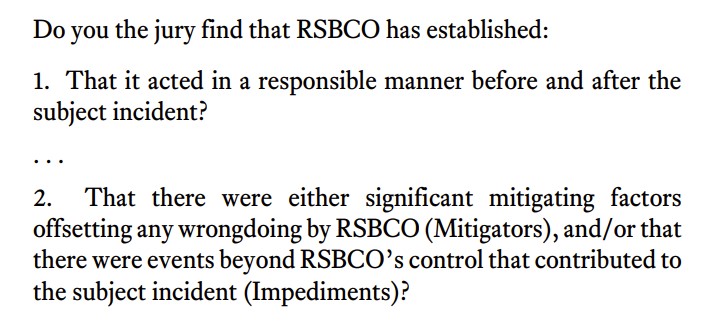 The jury answered “yes” to both questions. The problem emerged because the “mitigators” instruction for the second question was correct, but the “impediments” instrution was not. Therefore:
The jury answered “yes” to both questions. The problem emerged because the “mitigators” instruction for the second question was correct, but the “impediments” instrution was not. Therefore:
“Given the form’s single yes-or-no question as to mitigators ‘and/or’ impediments, there is no way logically to reconcile the verdict form to contain the improper instruction. Thus, the ‘challenged instruction could [well] have affected the outcome of the case,’ so we must vacate the verdict and remand for a new trial.”
No. 23-30062 (June 13, 2024) (citation omitted).
I didn’t really understand the issues in the bump-stock case until I saw the below graphic in Judge Elrod’s majority opinion for the en banc Fifth Circuit. Once I saw that, I realized why ATF had gone out over its skiis, and why the Supreme Court affirmed today.
As I argued a year ago, more than once, the Supreme Court holds 9-0 this morning that the mifepristone plaintiffs lacked standing:
 In 1949, a pipeline company received a grant from the Board of Mississipi Levee Commissioners to build and operate two crude oil pipelines in Issaquena County, Mississippi (the least populated county in the U.S. located to the east of the Mississippi River). A dispute arose over permitting fees, and the pipeline company sued the Levee Board for, inter alia, violating the Contract Clause of the U.S. Constitution.
In 1949, a pipeline company received a grant from the Board of Mississipi Levee Commissioners to build and operate two crude oil pipelines in Issaquena County, Mississippi (the least populated county in the U.S. located to the east of the Mississippi River). A dispute arose over permitting fees, and the pipeline company sued the Levee Board for, inter alia, violating the Contract Clause of the U.S. Constitution.
The Fifth Circuit affirmed dismissal: “Despite its significant investment in its pipelines, including their 2007 relocation, Mid Valley does not identify any affirmative or mutual obligations the Levee Board owed stemming from the 1949 Permit—because none are apparent in its express terms.” Accordingly, the Court distinguished this situation, where the permit clearly left complete discretion with the Board, from other permitting cases that did create some consideration / mutuality of obligation. Mid Valley Pipeline Co., LLC v. Rodgers, No. 23-60536 (June 5, 2024).
Governor Abbott has appointed the three inaugural members of the new Fifteenth Court of Appeals: Hon. Scott Brister, presently of Hunton Andrews Kurth, well-known statewide from his service on the Texas Supreme Court, and the author of City of Keller v. Wilson, 168 S.W.3d 802 (Tex. 2005); Hon. April Farris, of the First Court of Appeals; and Hon. Scott Field, of the 480th District Court in Williamson County, and formerly of the Third Court of Appeals.
 Little v Llano County addressed the removal of books from a public library, producing three opinions and a judgment affirming a preliminary injunction against the removal. The two judges voting to affirm focused on Circuit precedent, Campbell v. St. Tammany Parish School Board, 64 F.3d 184 (5th Cir. 1995), and its statement:
Little v Llano County addressed the removal of books from a public library, producing three opinions and a judgment affirming a preliminary injunction against the removal. The two judges voting to affirm focused on Circuit precedent, Campbell v. St. Tammany Parish School Board, 64 F.3d 184 (5th Cir. 1995), and its statement:
“that officials may not ‘remove books from school library shelves “simply because they dislike the ideas contained in those books and seek by their removal to `prescribe what shall be orthodox in politics, nationalism, religion, or other matters of opinion.'”
(cleaned up). The case also appears to present the first use of the phrase “butt and fart” (a shorthand for one set of the books at issue) in a three-opinion panel case. No. 23-50224 (June 6, 2024).
 SKAV, LLC, the operator of a Best Western hotel in Abbeville, Louisiana, sued a surplus-lines insurer about a hurricane-damage claim. The insurer sought to compel arbitration, based on a Louisiana statute that says:
SKAV, LLC, the operator of a Best Western hotel in Abbeville, Louisiana, sued a surplus-lines insurer about a hurricane-damage claim. The insurer sought to compel arbitration, based on a Louisiana statute that says:
A. No insurance contract delivered or issued for delivery in this state and covering subjects located, resident, or to be performed in this state, or any group health and accident policy insuring a resident of this state regardless of where made or delivered, shall contain any condition, stipulation, or agreement ..
(2) Depriving the courts of this state of the jurisdiction or venue of action against the insurer. …
D. The provisions of Subsection A of this Section shallnot prohibit a forum or venue selection clause in a policy form that is not subject to approval by the Department of Insurance.
Acknowledging differing approaches by district courts to examine this issue, the Fifth Circuit held in SKAV, LLC v. Indep. Specialty Ins. Co. that section (a)(2) of this statute applied to arbitration, and was not affected by section (D), which was fairly read as limited to forum and venue-selection clauses. No. 23-30293 (June 5, 2024).
Judge Easterbrook’s recent opinion about good fonts for legal writing emphasized the importance of “x-height,” which is the relative size of a small “x” to a capital letter in a particular font. It’s important to note, though, that x-height is only one of the relevant size measures, and an excessively high x-height can cause problems with “descending” letters such as “p” and “y.” This excellent article, from which the below illustration is taken, further explains this point while defining the other relevant measurements.
Legendary Seventh Circuit judge Frank Easterbrook has written authoritatively on many topics. Thanks to AsymaDesign, LLC v. CBL & Assocs. Mgmnt, Inc., the choice of a good font is now among them.
Judge Easterbrook noted that he was writing in Palatino Linotype, the standard font of the Seventh Circuit (and one of two that I regularly use, alternating with Book Antigua). He explained that it’s a desirable font for legal writing because it has a large “x-height” (the height of a lowercase “x” compared to a capital letter), along with similar fonts designed for book publication:
 The Appellant made the unfortunate choice of Bernhard Modern, a “display face suited to movie posters and used in the title sequence of the Twilight Zone TV show.” Because of that font’s low x-height, it’s hard to read in book-like writing:
The Appellant made the unfortunate choice of Bernhard Modern, a “display face suited to movie posters and used in the title sequence of the Twilight Zone TV show.” Because of that font’s low x-height, it’s hard to read in book-like writing:
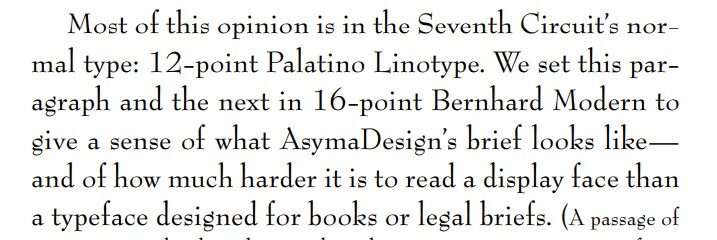 He concluded: “We hope that Bernhard Modern has made its last appearance in an appellate brief. “
He concluded: “We hope that Bernhard Modern has made its last appearance in an appellate brief. “
AAPS v. ABIM, No. 23-40423 (June 3, 2024), presented a question about pleading amendment, in which the Fifth Circuit said that the Galveston Division’s local rule about amendments was inconsistent with Fed. R. Civ. P.’s “liberal amendment scheme”:
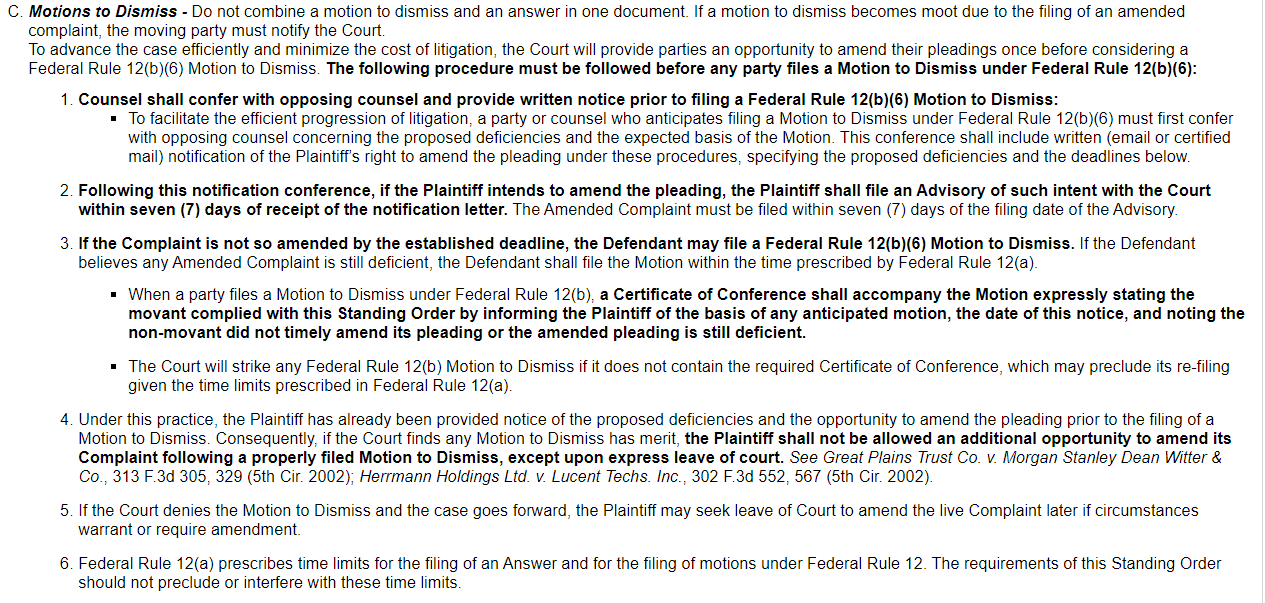 Other local rules on this, and other, common features of ciivl litigation may draw challanges as a result of this opinion.
Other local rules on this, and other, common features of ciivl litigation may draw challanges as a result of this opinion.
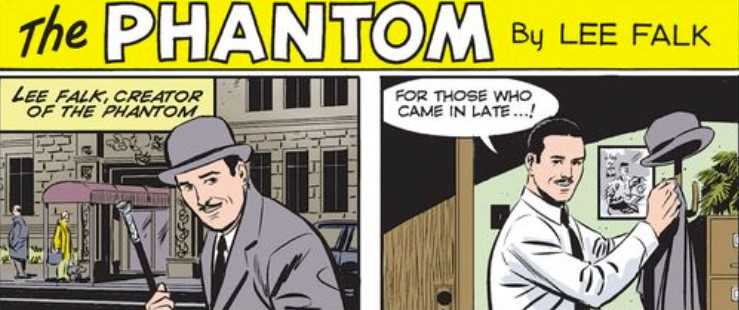 Longtime fans of the Phantom comic strip know that, when the plot becomes particularly complex, the strip’s author will make a cameo and give an update, announced by the phrase “For Those Who Came in Late!” In that spirit, 600Camp provides an update about the ongoing litigation about a CFPB rule involving credit-card late fees:
Longtime fans of the Phantom comic strip know that, when the plot becomes particularly complex, the strip’s author will make a cameo and give an update, announced by the phrase “For Those Who Came in Late!” In that spirit, 600Camp provides an update about the ongoing litigation about a CFPB rule involving credit-card late fees:
- On May 7, President Biden touted the rule in his State of the Union address.
- May 10, Judge Pittman enjoined the rule, based on a Fifth Circuit case about the CFPB’s funding that the Supreme Court overruled a few days later;
- On May 28, Judge Pittman granted the CFPB’s renewed motion to transfer the case to the District of Columbia (after an earlier transfer order was reversed by the Fifth Circuit, based on the procedural interplay between the injunction application and transfer motion);
- A new mandamus petition followed, leading to an administrative stay of the transfer order until mid-June along with a request for a reponse to the petition.
 The chaos caused by the Third Reich’s systematic theft of valuable art continues to the present day, as shown by Emden v. Museum of Fine Arts–a dispute about ownership of a painting called “The Marketplace of Pirna” (right). The claim of the heirs to the one-time owner failed because of the “act of state” doctrine, as the Fifth Circuit explained:
The chaos caused by the Third Reich’s systematic theft of valuable art continues to the present day, as shown by Emden v. Museum of Fine Arts–a dispute about ownership of a painting called “The Marketplace of Pirna” (right). The claim of the heirs to the one-time owner failed because of the “act of state” doctrine, as the Fifth Circuit explained:
The most straightforward and charitable reading of the Emdens’ complaint inevitably requires a ruling by a U.S. court that the Dutch government invalidly sent Moser the By Bellotto Pirna. The Emdens may be right: The Monuments Men may have improperly sent the By Bellotto Pirna to the [Dutch Art Property Foundation (“SNK”)]; the SNK may have unjustifiably sent Moser the By Bellotto Pirna even though he had a claim to only the After Bellotto Pirna; and the Museum may be violating the Washington Principles by refusing to return the painting to the Emdens.
But, per the act of state doctrine, it is not our job to call into question the decisions of foreign nations. As pleaded, the SNK’s shipping Moser the By Bellotto Pirna is an official act of the Dutch government. The validity and legal effect of that act is one that we may not dispute.
No. 23-20224 (May 29, 2024).
